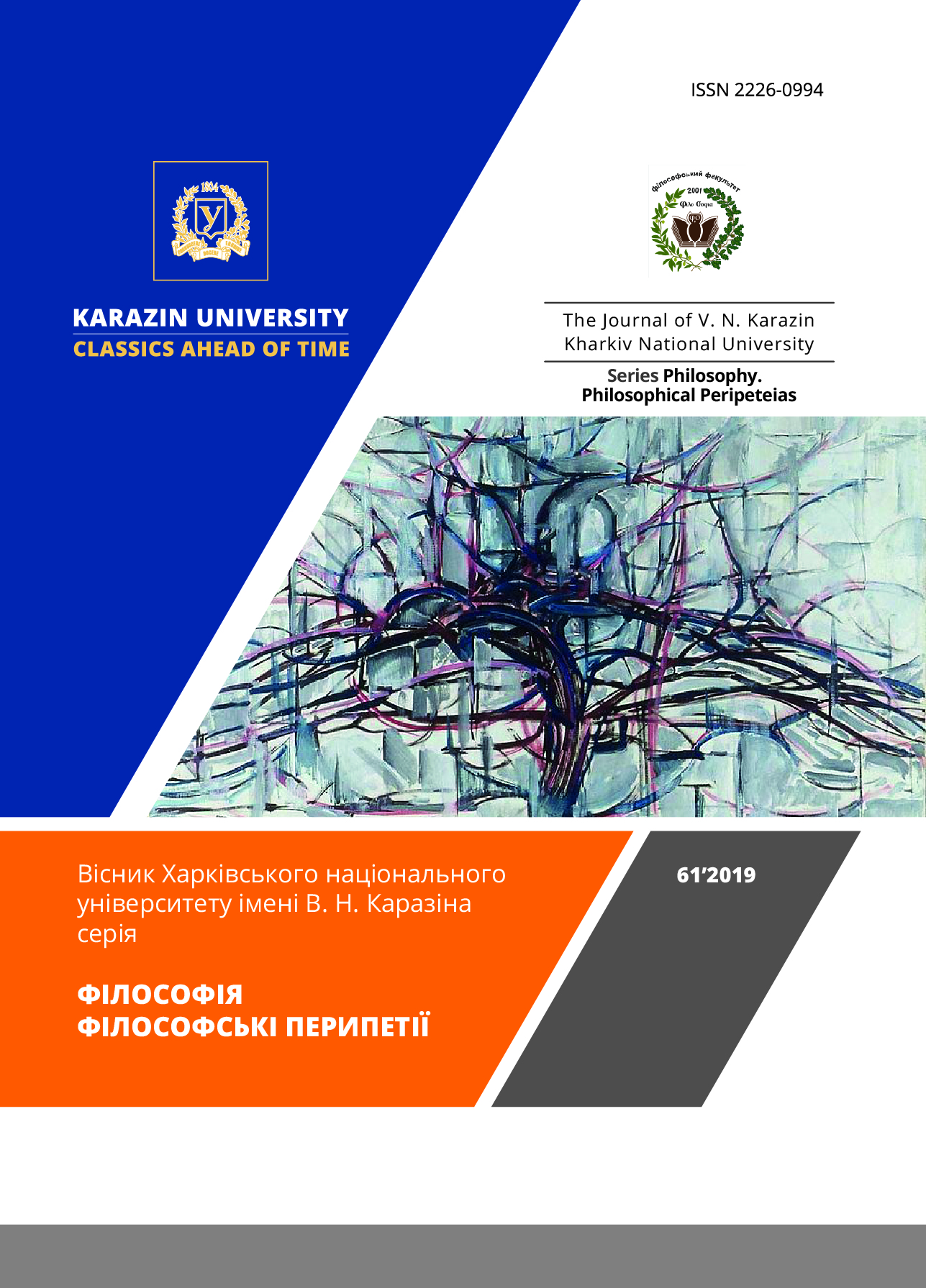REABILITATION OF ETHICS THROUGH THE PRISM OF INDIVIDUAL BIOGRAPHY (A. MACINTYRE, H. ARENDT)
Abstract
The purpose of the article is to study ethical problematics in the philosophical works of Alasdair MacIntyre and Hannah Arendt. On the one hand we have the analysis of virtues ethics and of its place in modern society (through the prism of emotivism ethics inherent to this society), and on the other hand, we have the analysis of action and judgment as scopes of person’s self-representation, which are valuable by themselves. MacIntyre developed his hypothesis about an individual biography pointing out that modern emotivism ethics does not leave a room for conscious ethical worldview, reduces the scope of ethical choice to the very statement of individual preference. By that, a sequence of ethical decisions and preferences in a person’s life acquires irrational and wayward nature, due to which conscious transition from one narrative to another becomes impossible. In its turn, the possibility of individual biography as a holistic story that everyone can tell about themselves provides such an informative nature of ethical views, which have features of a narrative that can be rationally told and rationally perceived by others. Hannah Arendt analyzed the issue of modern ethical crisis from the other side – she studied the ethical dimension of judging ability and the role of action in social interaction. An action (as Arendt believed) becomes the strictly human scope of human activity, in which personality can “open up” (unlike the areas of work and creation). Judging ability appears in this context as a foundation, thanks to which a person becomes able to act: ethical worldview exists in terms of evaluation of something that exists in relation to something due. An action in this context is an active embodiment of a certain worldview position that “unfolds” itself precisely in the area of ethics while being involved in interpersonal interaction. Arendt claimed that an action, due to its nature, is unpredictable and that every human being, who dares to take it, risks getting, in the end, a result that is far from their intentions. Exactly because of it, an action exists in the actor’s biography and the fabrics of interpersonal connections simultaneously – it is the latter, which gives the space for interpretation of an actor’s actions significance. Thus, the individual biography becomes the thing that makes sense only through the prism of interpersonal interaction and mutual interpretations of individual stories.
Downloads
References
/References
Arendt, H. (2000). Vita Activa or about Efficient Life. (V. Bibikhin, Trans.). Saint Petersburg: Aletheia. (Original work published 1958). (In Russian).
Arendt, H. (2013). The Life of the Mind. (A. Govorunov, Trans.). Saint Petersburg: Nauka. (Original work published 1977). (In Russian).
Arendt, H. (2011). Lectures on Kant’s Political Philosophy. (A. Gluhov, Trans.). Saint Petersburg: Nauka. (Original work published 1982). (In Russian).
Kant, I. (2000). Lectures on Ethics. (A. Huseynov, Trans.). Moscow: Respublika. (In Russian).
Kierkegaard, S. (2005). Concluding Unscientific Postscript to Philosophical Fragments. (N. Isaeva, S. Isaev, Trans.). Saint Petersburg: Saint Petersburg State University Publishing House. (In Russian).
Kierkegaard, S. (2011). The Balance between Esthetical and Ethical in the Person’s Development. In S. Kierkegaard, Either / Or. The Fragment of Life: in 2 parts. (N. Isaeva, S. Isaev, Trans.). Saint Petersburg: Russian Christian Humanistician Academy Publishing House; Amphora. (In Russian).
MacIntyre, A. (2000). After Virtue: Investigations of Moral Theory. (V. Selishchev, Trans.). Moscow: Akademichesky Proekt. Retrieved from http://rebels-library.org/files/posle_dobrodeteli.pdf. (Original work published 1981). (In Russian).
Арендт Х. Vita activa, или О деятельной жизни / пер. с нем. и англ. В. В. Бибихина. СПб.: Алетейя, 2000. 437 c.
Арендт Х. Жизнь ума / пер. с англ. А. В. Говорунова. СПб.: Наука, 2013. 517 с.
Арендт Х. Лекции по политической философии Канта / пер. с англ. А. Глухова. СПб.: Наука, 2011. 303 с.
Кант И. Лекции по этике /пер. с нем., общ. ред., сост. и вступ. ст. А. А. Гусейнова. М.: Республика, 2000. 431 с.
Кьеркегор С. Заключительное ненаучное послесловие к «Философским крохам» / пер. с датского Н. Исаевой и С. Исаева. СПб.: Изд-во С.-Петерб. ун-та, 2005. 680 с.
Кьеркегор С. Равновесие между эстетическим и этическим в развитии личности. Кьеркегор С. Или – или. Фрагмент из жизни: в 2 ч. / пер. с дат., вступ. ст., коммент., примеч. Н. Исаевой и С. Исаева. СПб.: Издательство Русской Христианской Гуманитарной Академии: Амфора. ТИД Амфора, 2011. С. 632–807.
Макинтайр А. После добродетели: Исследования теории морали / пер. с англ. В. В. Целищева. М.: Академический проект; Екатеринбург: Деловая книга, 2000. URL: http://rebels-library.org/files/posle_dobrodeteli.pdf.
Citations
NOOGENETIC NEUROSIS, NOODYNAMIC PROCESSES AND SELF-REFLECTION PERSONALITY IN EXISTENTIAL ANALYSIS AND LOGOTHERAPY
Shcherbakova Anastasiya (2024) The Journal of V. N. Karazin Kharkiv National University, Series "Philosophy. Philosophical Peripeteias"
Crossref
Authors who publish with this journal agree to the following terms:
- Authors retain copyright and grant the journal right of first publication of this work under the terms of a license Creative Commons Attribution License 4.0 International (CC BY 4.0).
- Authors are able to enter into separate, additional contractual arrangements for the non-exclusive distribution of the journal's published version of the work (e.g., post it to an institutional repository or publish it in a book), with an acknowledgement of its initial publication in this journal.
- Authors are permitted and encouraged to post their work online (e.g., in institutional repositories or on their website) prior to and during the submission process, as it can lead to productive exchanges, as well as earlier and greater citation of published work.






3.gif)




